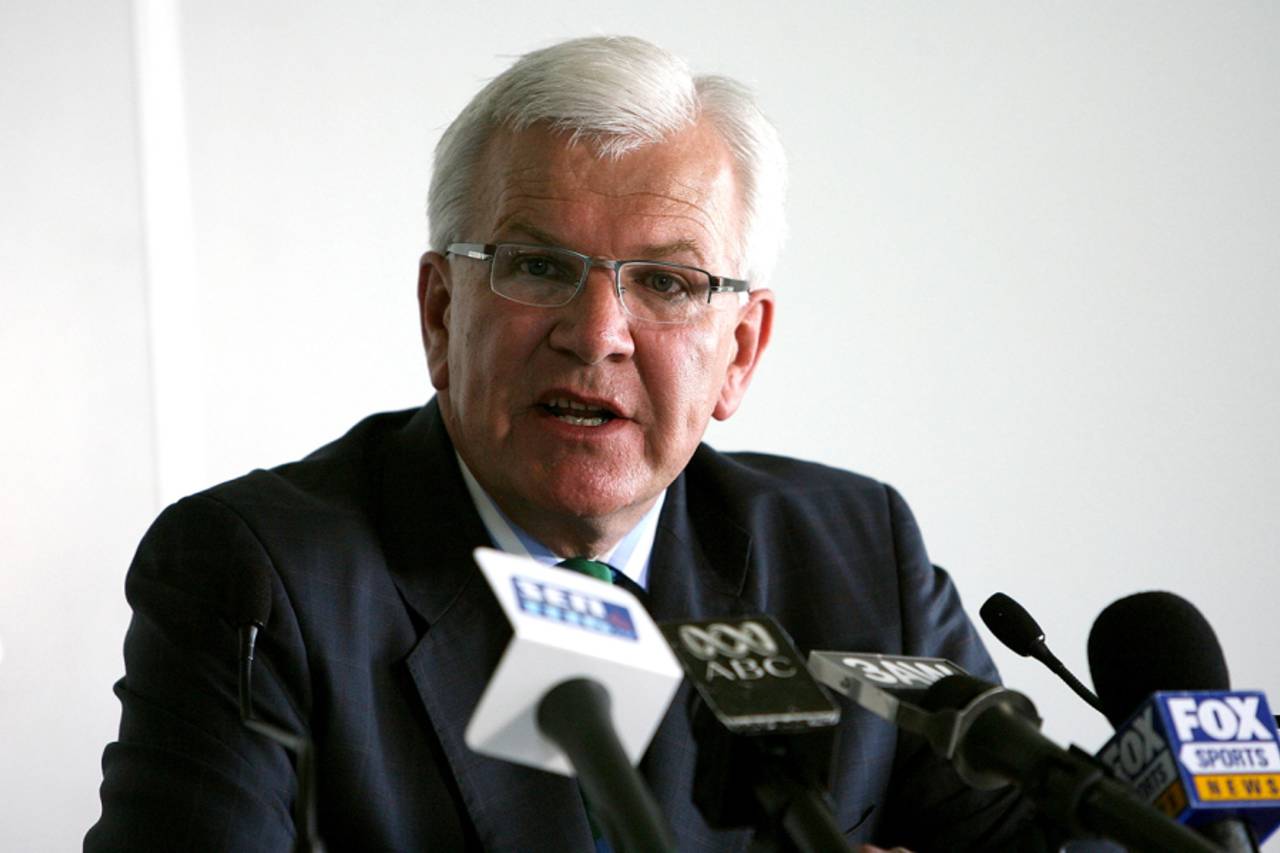At the precise moment Malcolm Speed, the ICC chief executive, was saying sorry for the bizarre ending of the World Cup final the ICC hoarding behind him came unstuck from the wall, and almost hit his head. Sitting alongside Speed as he admitted that the events in Barbados the day before amounted to the biggest farce in the game's history was the ICC's general manager, David Richardson.
"David and I are here on behalf of ICC, to say to the wider stakeholders of the game that we too are very sorry this incident occurred at the end of what, on any view, had been an outstanding day of cricket," he said. "We very sincerely apologise for the error that was made.
"It was an unnecessary error, a fundamental error. It was made under difficult circumstances at the end of the match, and it's not a good image for the game. We would have far preferred if news highlights had been some of the great cricket played and some of the great decisions made by the umpires. It was unfortunate, a very sad way to finish the World Cup."
It was, however, left to Richardson, who is in charge of the game's elite officials, to try to find an explanation for the monumental breakdown in communications that led five senior officials to impose a phantom regulation on a dead contest. Unsurprisingly, he couldn't.
"They are at a loss to try to explain," Richardson said. "I can only say it's similar to the situation where you are sitting at home and the answer to a quiz question on TV looks very simple, but you just lose your train of thought when you are in that heated, pressure situation. It only takes one guy to sow a seed of doubt in the other people's minds.
"What worries me, as the guy ultimately responsible for how match officials perform, is that we get ourselves into a pressure situation and we are not able to cope with it. That's what it's about, whether you are playing or officiating. Malcolm has said we are not going to over-react, but we are certainly going to take it very seriously and look at how it could have happened."
There will be no sackings or resignations as a result of this fiasco, and Speed said he had not had any reason to reassess his own position as chief executive. But the tone of an otherwise humble press conference changed markedly when the name of Darrell Hair was thrown into the ring.
After the ball-tampering row erupted at The Oval last September, Hair was hung out to dry by his employers. He was removed from the elite panel and further humiliated through the release of personal correspondence between himself and Doug Cowie, the ICC's umpires and referees manager. Though other issues followed, his primary crime had been to stick dogmatically to the [correct] letter of the law. If only Rudi Koertzen and his fellow officials had been as diligent in their reading of the rules.
"The Darrell Hair issue is and was quite complicated and will be ultimately resolved in an employment tribunal in London later this year," Speed said, with a crocodilian stiffening of his sinews. "Darrell Hair is still employed by ICC, his contract is being honoured. To put the two together, I think it's drawing a long bow and unfair to these five officials who were involved in the incident yesterday."
Inevitably, Speed felt obliged to accentuate the positives of the tournament. "We've had cricket on the back pages and, unfortunately, on the front pages for seven weeks," he said, still believing in the old adage that any publicity is good publicity. "Lots of people who had not been exposed to cricket have seen cricket and been aware this World Cup has been in full swing.
"The cricket grounds we now have in the West Indies are outstanding, as good as any in the world. They have been built by the governments of the respective countries and they've looked at it as a long-term investment. In places like Guyana and Grenada they are very proud of what they've done and they should be proud of what they've done because they're small countries with small populations that wanted to be involved in a world event."
What comes next, however, for these islands? The world event has been and gone, and in most cases the stadia were not remotely full. Admittedly several thousand temporary seats will be removed from most venues, but the burden of constant maintenance and the scrap for future marquee events could stretch the island's fragile allegiances to breaking point.
Speed did not see it like that. "West Indies cricket now has a terrific problem," he said. "It now has this collection of five-star cricket grounds so when Australia comes here next year they're going to have an almighty argument about where Australia play their Test matches and one-day internationals." An almighty argument. Only the ICC could see that sort of a legacy as a positive.
Andrew Miller is UK editor of Cricinfo
